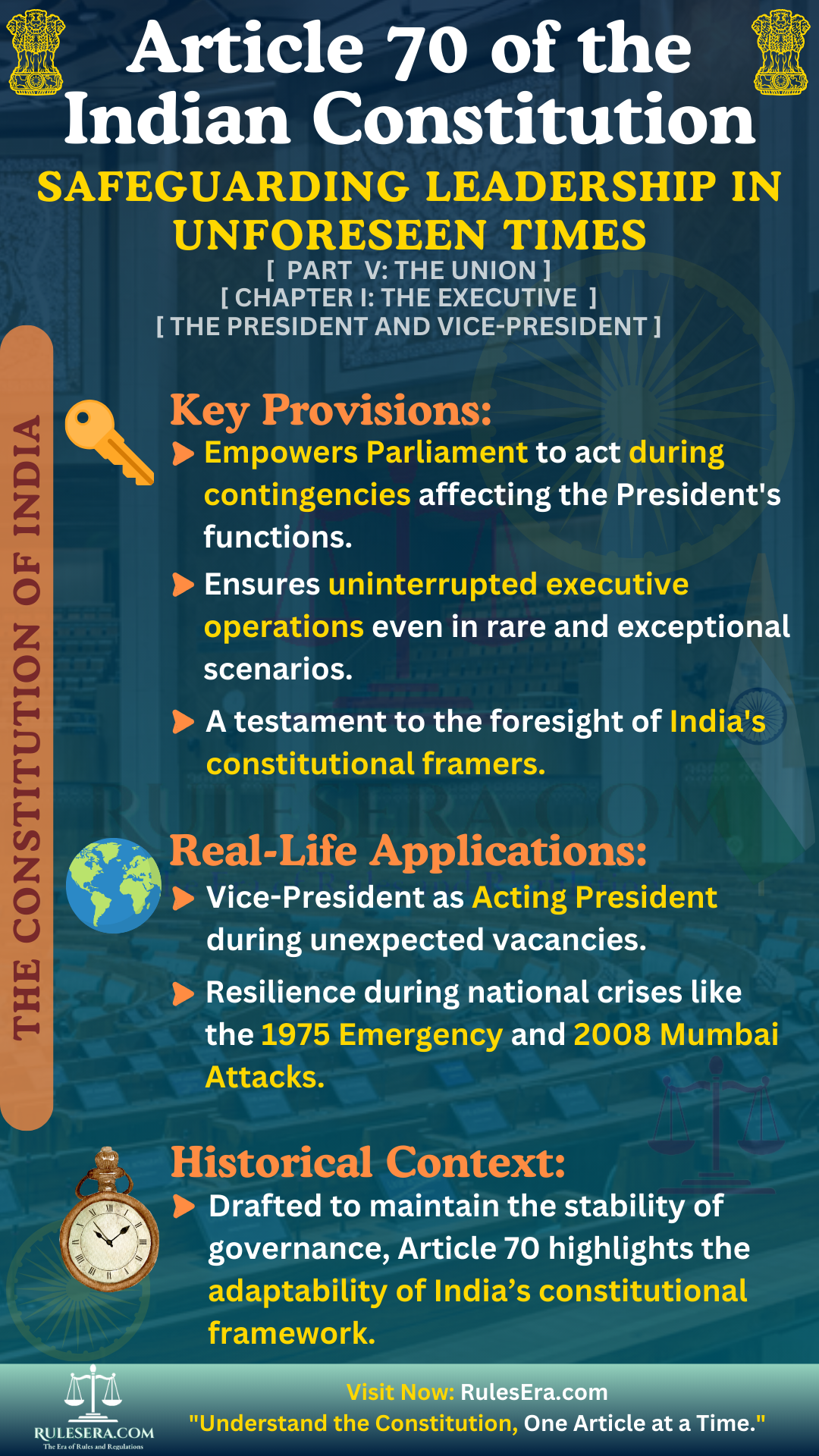Part V: The Union
Chapter I: The Executive
Article 70: Discharge of President's Functions in Other Contingencies

--- Original Article ---
Parliament may make such provision as it thinks fit for the discharge of the functions of the President in any contingency not provided for in this Chapter.
Explanations
Article 70 of the Constitution of India provides a vital mechanism for maintaining governance continuity when the President is unable to discharge their duties due to circumstances that are not explicitly covered in the Constitution. It allows Parliament to step in and create provisions for such unforeseen contingencies, ensuring the uninterrupted functioning of the executive branch.
Key Provisions:
- Parliamentary Provision for Unforeseen Contingencies: The Constitution includes specific provisions for when the President’s office is vacant or when the President is unable to perform their duties due to impeachment, illness, or other reasons. However, it is impossible to anticipate every scenario. Article 70 provides for those rare or exceptional cases by granting Parliament the power to decide how the President’s functions should be carried out.
- Ensuring Continuity in Governance: The primary concern addressed by this article is ensuring that the executive functions are never interrupted. Parliament can pass laws or implement measures to ensure that governance continues, no matter how unusual the circumstances. This maintains the functioning of the Republic at the highest level.
Amendments:
There have been no significant amendments to Article 70. Its broad phrasing has proven sufficient in providing flexibility to Parliament to act in unforeseen contingencies.
Real-Life Examples:
- Vice-President’s Role as Acting President: There have been instances when the Vice-President has assumed the role of Acting President due to the President’s death or resignation. While these are standard scenarios covered in other articles, if a similar situation arises where neither the Vice-President nor any other official can assume the role, Article 70 allows Parliament to legislate a solution, ensuring continuity.
- Post-2008 Mumbai Attacks: After the 2008 Mumbai attacks, there were discussions on how the country's executive would function in the event of a broader crisis affecting the government. While this did not directly invoke Article 70, it highlighted the importance of having fallback mechanisms in place, which this article ensures.
- 1975 Emergency: During the National Emergency declared in 1975, when the functioning of executive powers became critical, Article 70 provided a constitutional safeguard for continuity in governance. Although Emergency provisions under Article 352 were invoked, the general principle of ensuring the uninterrupted functioning of the President's office held through contingency planning.
Historical Significance:
Article 70 demonstrates the foresight of India’s constitutional framers. They recognized the importance of a mechanism that would safeguard governance against disruptions, even in extraordinary and unanticipated situations. By empowering Parliament to address such contingencies, this article protects the constitutional framework and the stability of the executive office.
References:
- Constituent Assembly Debates: The need for flexibility in governance and Parliament's role in safeguarding constitutional integrity were frequently discussed during the drafting of the Constitution.
- Legal and Constitutional Commentaries: Various legal scholars have emphasized the importance of Article 70 in maintaining the resilience of the Indian government’s executive functions in emergency situations.
Legislative Background:
Article 69 of the Indian Constitution, originally formulated as Article 57 of the Draft Constitution, was officially integrated into the Indian Constitution on December 29, 1948.
Debates and Deliberations:
In the deliberations of the Constituent Assembly regarding Article 70 of the Indian Constitution, Prof. K. T. Shah proposed an amendment to include provisions for the Vice-President alongside the President in unforeseen contingencies. Shah underscored the potential governance gaps arising from the current wording, which solely addresses the President's role. He argued for empowering Parliament to address scenarios where both the President and Vice-President are incapacitated.
In opposition, Mr. Tajamul Husain contested Shah's amendment, expressing concerns about the potential neglect of the President's duties if Parliament had to choose between the two roles. He further emphasized the limited functions of the Vice-President beyond chairing the Council of States, deeming the proposed amendment unnecessary.
Dr. B. R. Ambedkar intervened to clarify that excluding the Vice-President was a deliberate choice. He emphasized the Vice-President’s primary role as Chairman of the Council of States, which is already adequately addressed in the Constitution. Additionally, provisions for a Deputy Chairman are in place to ensure continuity in the Vice-President's absence.
Ultimately, Prof. Shah’s proposal was rejected, and Article 70 was incorporated into the Indian Constitution without amendments, reflecting the Assembly's commitment to ensuring the seamless functioning of the Presidential office under unforeseen circumstances.
Frequently Asked Questions (FAQs):
Article 70 grants Parliament the power to make provisions for the discharge of the President's duties in any contingency not explicitly covered by the Constitution.
While there are no notable direct invocations of Article 70, its provision ensures that Parliament can step in to address unforeseen contingencies to maintain governance continuity.
No, Article 70 allows Parliament to make provisions for discharging the President’s duties only in unforeseen contingencies, not to alter the constitutional powers of the President.